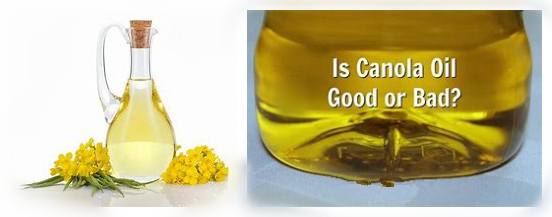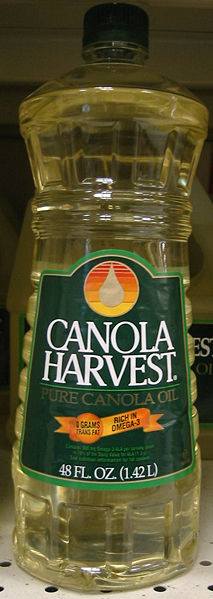Choosing a canola oil substitute can be hard, since other oils cannot compare to canola oil in terms of price, versatility, usefulness, long shelf life, and health benefits.
This genetically engineered vegetable oil invented by Canadians in the 1980s has gone a long way from its initial purpose of satisfying mass production demands at the time of its manufacture.
The term “canola oil” is an abbreviation for “Canada Oil, Low Acid”. It is derived from crushing the seeds of the rapeseed plant. The intensive manufacturing process that it undergoes removes the high Eruric Acid content commonly found in rapeseed oil, which is harmful for living things. The result is a refined canola oil rich in nutrients and fit for consumption.
Canola Oil Facts

What Makes Canola Oil Special?
There are many reasons why canola oil is widely used at present in every household across the globe.
- Cheap price – This all-around cooking oil can be bought in any grocery store because canola oil prices are very affordable compared to other oils like olive oil.
- Neutral flavour and mild aroma – Canola oil can serve as a basic ingredient for making sauces, dressings, and marinades, because its neutral flavour does not ruin the taste of other food ingredients and spices. This is also the reason why this oil is good for baking and making flavourful dishes. It brings out, rather than clashes with, the taste of the food.
- Light texture – The light texture of this liquid makes it easy to mix and pour on the pan. One can easily control the amount of oil to put.
- High Heat Tolerance – The oil is also ideal for frying chicken because it can withstand high temperature.
- High on Monounsaturated Fat and Omega 3 Fatty Acid – There are many canola oil health benefits that can be derived from using this cooking oil. The oil contains more than half of monounsaturated fat and a good amount of Omega 3 fatty acid, thus reducing the chances of heart diseases by maintaining the blood pressure and normal heart rate of the body. However, one canola oil danger is also precisely its Omega 3 fatty acid content. This is because very high temperatures can convert these healthy fats into harmful substances.
- Low on Trans Fat and Saturated Fat – As high as the oil contains good fat, it also contains one of the smallest amounts of bad fat, such as trans fat and saturated fat, compared to other oils. It contains less than 1% of trans fat content, in fact.
Canola Oil on Health

- Canola oil is a derivative of the rapeseed plant developed to lower the toxicity of rapeseed.
- The name Canola comes from “Canadian oil, low acid”
- Canola oil is generally claimed to be high in Omega-3 compared to other commonly used oils. However, the Omega-3 oil is converted to transfats during processing and the bottled product may be as high as 4.6% transfats.
- Care should be taken when cooking with canola oil as it may turn to transfat if overheated and boost your cholesterol significantly.
- Avoid any products that contain hydrogenated canola oil, as this process removes all of the health benefits and introduces transfats.
- A diet rich in canola oil may actually cause heart disease.
- Canola oil is a genetically modified crop with all the dangers that implies. About 80% of the current crops are genetically modified and genetically modified canola plants can now be found growing wild in the US.
- Rapeseed and canola oils have been linked to autism
Allergies
Canola oil allergies may be misdiagnosed as arthritis, dermatitis, psoriasis. The oil may aggravate these conditions, or may be the sole cause. you may be able to eliminate or reduce the effects of these conditions by ceasing all consumption of canola oil. It may take several days for the effects to appear, and up to two weeks for the effects to abate and for the oil to work its way out of your system. A person may be allergic to consumed oils in food and be unaffected by oils applied topically to the skin. Peanut allergies are considered closely related to canola oil allergies.
Skin Reactions
Canola oil can cause skin reactions in two ways: direct contact and ingestion. Direct contact is usually thru use of cosmetics, but may also occur during handling of the oil in the food manufacturing and cooking industries. Ingestion of the oil may cause adverse skin reactions due to immediate allergic reactions or from delayed contact reactions as the oil is secreted from pores in the skin as the body eliminates the oil. You may experience a reaction 1-2 days after consuming the oil and during periods of exercise.
How to Avoid
To avoid canola oil, you pretty much have to avoid processed foods and restaurants. The oil is commonly used for frying and as a cheap substitute for corn oil since farmers are either exporting or diverting corn to ethanol production due to government incentives. It is also used in soaps lotions and other beauty products. Cooking with whole foods is your best defense. Wait staff in restaurants cannot be trusted to correctly identify oils and may be unable to do so as oil mixtures are common.
It is important that you check the labeling on every product you buy that you may consume or apply to your body to determine if it contains canola oil including soaps, lotions, food, vitamins, medicines, cleaners, mayonnaise, spreads, dressings, cooking oils and spices. Product ingredients are changed often to reduce costs. So check every time you buy.
What is a good substitute for canola oil?
A good canola oil substitute would be one that most closely resembles the nutritional profile and heat tolerance of canola. Unfortunately, other famous cooking oils are similar to canola oil only on one or two aspects, but not with other aspects.
- Olive oil – Olive oil is the one most similar to canola oil. For one, the two oils are good for salad dressings. Both contain high amounts of good fat and Omega 3 fatty acid and a small content of saturated fat. However, when it comes down to these two oils, canola oil still beats the nutritional value of olive oil. Plus, this alternative is also thrice as expensive as canola. Although olive oil is good for salads because of its good flavour, it might be a waste to use it for normal, everyday cooking. This is because the oil’s taste would merely be lost amid other ingredients. Perhaps the best feature of olive oil is its being organic, in contrast to canola, which is genetically engineered. This is perfect for health buffs who prefer to eat natural food. One is assured of the absence of health implications of this alternative. No one can say anything bad about olive oil in contrast to canola oil, which received some hesitation from other people that are scared of ingesting processed oil.
- Peanut oil – Like canola oil, peanut oil is good for frying because this substitute can stand high temperatures, perhaps more so than canola. However, it does not contain half as much nutritional value as the original choice. In fact, it is high in calories.
Also, peanut oil has a strong flavour, so though it might be good for roasting turkey and chicken, the taste can clash with other dishes, unlike canola, which can blend well with other ingredients for any dish. - Corn oil – This may be a good option because like canola, it is high on good fat and even vitamin E. However, the oil is also high on trans fat and saturated fat.
- Palm oil – Palm oil, like canola, is affordable and versatile for any dish. It is also highly resistant to oxidation, thus possessing a longer shelf life than other oils. However, it contains a high amount of saturated fat, which is bad for the body.
- Coconut oil – Derived from the fruit meat of the coconut tree, coconut oil is anti-fungal and anti-bacterial, which makes it good for the skin and hair. It is also good for the heart, for curing stress, obesity, diabetes, kidney problems, and many more. However, this oil costs higher than canola oil. More importantly, it also contains a high amount of bad fat, similar to corn oil and palm oil.
The perfect substitute for canola oil will ultimately depend on the consumer’s needs, but a look at the profiles of the different oils available on the market are necessary so as to know how alternatives compare to the first choice. At the end of the day, a good canola oil substitute is one which satisfies one’s nutritional and gustatory requirements without creating a dent in the wallet.

